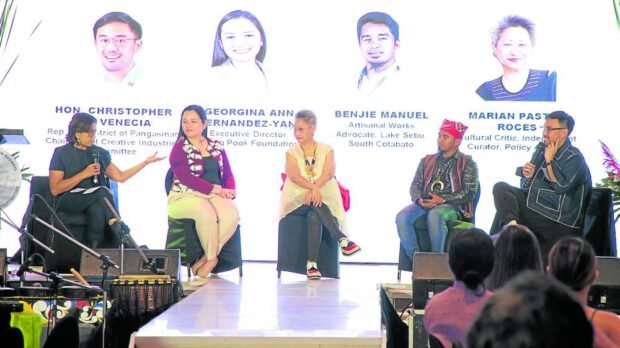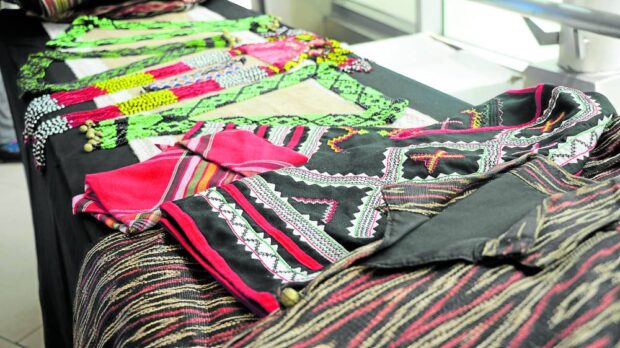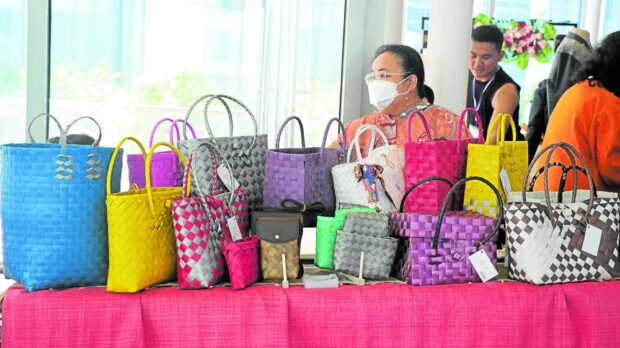Digitalization isn’t the end of the handmade

TRADITIONAL ART TALK (From left) Ces Drilon, Georgina Hernandez-Yang, Marian Pastor Roces, Benjie Manuel and Christopher de Venecia —CONTRIBUTED PHOTOS
Can handmade products survive in a digital world?
If applied prudently and thoughtfully, new technologies can enhance and promote traditional handmade products, like the Philippines’ numerous indigenous fabrics and woven craft.
At the recent conference on “The Future of the Handmade in a Digital World,” government officials, artisans, supporters and other stakeholders were optimistic that new technologies could help improve the connection between producers and their customers, expand the market and allow for more tailor-fit products, even without face-to-face interaction between craftsperson and buyer.
Undersecretary Blesila Lantayona of the Department of Trade and Industry (DTI) says “touch points have to be found where technology can bridge gaps” between buyers and sellers and expand the market for handmade craft. She stresses the need to “work and protect skills, technologies, histories, livelihood and future” of Philippine indigenous peoples (IP).
“Handmade crafts embody the values of the indigenous community (the main producers of the products). We have to find ways for crafts to survive and flourish (in a digital world),” she says.
Technology, she notes, could enhance and promote traditional products.
Lantayona assures Filipino artisans and craftspeople of DTI’s “firm support for the creative sector” and in shaping the ecosystem that would use digital technology to promote and enhance traditional handicraft.

WOVEN Handmade crafts embody the values of the indigenous community, says Trade Undersecretary Blesila Lantayona
Heritage
Benjie Manuel, artisanal work advocate from Lake Sebu, South Cotabato, echoes Lantayona’s message that traditional indigenous craft have to be preserved and protected.
“It (handmade) is an inheritance, a heritage passed on from generation to generation, both present and future,” says Manuel, a participant in the panel on “Can Traditional Art Absorb the Digital Future?”He endorses a culture-based education in a senior high school in his province where experts teach indigenous skills. “[We] should not take out [indigenous] arts [in the school curriculum] but enhance them.”
He adds that a new market is emerging for traditional woven things. While before they were only sought for special occasions, people are now buying them for everyday casual wear.
However, he laments that sellers could not set the right price and often have to accept the buyer’s low offer.
Manuel also notes that young people—who could bridge the digital divide between old and new craftsmen because they are tech-savvy—spend more time using their gadgets to go on social media instead of learning crafts.
Marian Pastor Roces, cultural critic, independent curator and policy analyst, says digital technology should be used to understand what the crafts are all about. Panelist Georgina Ann Hernandez-Yang, executive director of Galing Pook Foundation, says many innovations and initiatives in the use of technology are already being introduced and adopted in some provinces and towns.
House Rep. Christopher de Venecia of the fourth district of Pangasinan says “digital technology could be a solution to reducing the [participation of] middlemen and connecting artisans directly with buyers.”
De Venecia, principal proponent of Republic Act No. 11969, or the Cultural Mapping Law, notes that the “lives of traditional craftsmen have hardly improved while those who buy (their products) earn so much.”

NOT MASS-PRODUCED Colorful bags showcased at the forum organized by Women’s Business Council Philippines and Women at Work. —CONTRIBUTED
Help from the young
In the second panel discussion on “Crafting Collaborations across Practices,” Jowee Alviar, graphic designer and founder of Team Manila, says young people, being tech-savvy, are actually able to help promote traditional arts and crafts in the digital language of the young.
Noreen Bautista, chief executive officer and cofounder of Panublix Iloilo, says if the farm-to-table trend is growing, farm-to-fashion is an emerging initiative that is helping farmers producing local fibers to connect directly with the market.
According to the panel, which also included Celia Elumba, former head of the Department of Science and Technology’s Philippine Textile Research Institute, and Evelynda Otong, weaver
